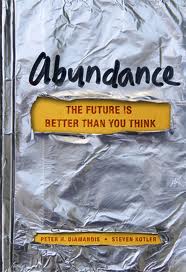
The early part of the book lays out the bold promise of abundance through connectivity, the global availability of water, unlimited energy, education and health care. The latter part of the book explores three forces fueling the promise: the age of the DIY innovator, technophilanthroy, and ‘the rising billion (everyone with a smartphone is empowered).’ The fuel for abundance will be new transformational technologies such as networks and sensors, AI, robotics, biotechnology, bioinformatics, nanotechnology, and 3-D printing. The overlying theme of Abundance echoed Shirky’s concept of a cognitive surplus.
Standing in sharp contrast to those apocaholics selling the idea that the Internet will be the end of us, Abundance offers a fresh vision of how technology may actually make the world a better place. Arguments are well substantiated. There is a chapter on health that I felt could have offered stronger examples of an abundant future.
Abundance is fodder for the technooptimst and core reading for the aspiring futurist. I enjoyed the powerful closing remarks of the book which support my core belief that we have the capacity to shape the future:
Proverbs 29:18 tells us: “Where there is no vision, the people will perish.” Perhaps that’s true, but it’s also myopic. Abundance is both a plan and a perspective. This second bit is key. One of the more important points made throughout this book is that our perspective shapes our reality. The best way to predict the future is to create it yourself. So while the Bible offers a warning, it’s helpful to remember that the inverse is also true: where there is vision, the people flourish. The impossible becomes the possible. And abundance for all becomes imagine what’s next.
For another optimistic view of our future you may like Matt Ridley’s The Rational Optimist.
Amazon links are affiliate links.